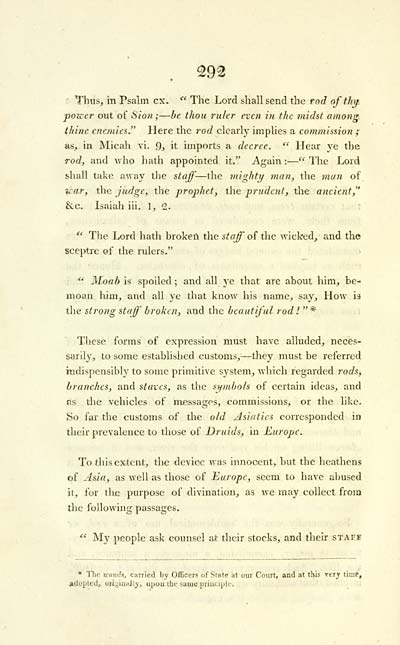Blair Collection > Celtic researches, on the origin, traditions & language, of the ancient Britons
(384)
Download files
Complete book:
Individual page:
Thumbnail gallery: Grid view | List view

292
Thus, in Psalm ex. " The Lord shall send the rod of thif.
power out of Sion; — be thou ruler even in the midst among,
thine enemies." Here the rod clearly implies a commission ;
as, in Micah vi. 9^ it imports a decree. " Hear ye the
rod, and who hath appointed it." Again : — '' The Lord
shall take away the staff — the mighty man, the muii of
%car, the judge, the prophet, the prudent, the ancient,"
&.C. Isaiah iii, 1,2.
'' The Lord hath broken the staff of the wicked, and the
sceptre of the rulers."
" Mcab is spoiled ; and all ye that are about him, be-
moan him, and all ye that knoAv his name, say. How iá
the strong staff' broken, and the beautiful rod ! " *
These forms of expression must have alluded, neces-
sarily, to some established customs,• — they must be referred
radispensibly to some primitive system, which regarded rods,
branches, and staves, as the symbols of certain ideas, and
as the vehicles of messages, commissions, or the like.
So lar the customs of the old Asiatics corresponded in
their prevalence to those of Druids, in Europe.
To this extent, tlie device was innocent, but the heathens
of Jlsia, as well as those of Europe, seem to have abused
it, for the purpose of divination, as we may collect from
the following passages.
'' M^^ people ask counsel ;it their stocks, and their staff
* The wands, carried by Officers of State at our Court, and at this very tinrt,
adopted, ori^inajly, upon the same priiicipk•.
Thus, in Psalm ex. " The Lord shall send the rod of thif.
power out of Sion; — be thou ruler even in the midst among,
thine enemies." Here the rod clearly implies a commission ;
as, in Micah vi. 9^ it imports a decree. " Hear ye the
rod, and who hath appointed it." Again : — '' The Lord
shall take away the staff — the mighty man, the muii of
%car, the judge, the prophet, the prudent, the ancient,"
&.C. Isaiah iii, 1,2.
'' The Lord hath broken the staff of the wicked, and the
sceptre of the rulers."
" Mcab is spoiled ; and all ye that are about him, be-
moan him, and all ye that knoAv his name, say. How iá
the strong staff' broken, and the beautiful rod ! " *
These forms of expression must have alluded, neces-
sarily, to some established customs,• — they must be referred
radispensibly to some primitive system, which regarded rods,
branches, and staves, as the symbols of certain ideas, and
as the vehicles of messages, commissions, or the like.
So lar the customs of the old Asiatics corresponded in
their prevalence to those of Druids, in Europe.
To this extent, tlie device was innocent, but the heathens
of Jlsia, as well as those of Europe, seem to have abused
it, for the purpose of divination, as we may collect from
the following passages.
'' M^^ people ask counsel ;it their stocks, and their staff
* The wands, carried by Officers of State at our Court, and at this very tinrt,
adopted, ori^inajly, upon the same priiicipk•.
Set display mode to: Large image | Transcription
Images and transcriptions on this page, including medium image downloads, may be used under the Creative Commons Attribution 4.0 International Licence unless otherwise stated. ![]()
| Early Gaelic Book Collections > Blair Collection > Celtic researches, on the origin, traditions & language, of the ancient Britons > (384) |
|---|
| Permanent URL | https://digital.nls.uk/75768119 |
|---|
| Description | A selection of books from a collection of more than 500 titles, mostly on religious and literary topics. Also includes some material dealing with other Celtic languages and societies. Collection created towards the end of the 19th century by Lady Evelyn Stewart Murray. |
|---|
| Description | Selected items from five 'Special and Named Printed Collections'. Includes books in Gaelic and other Celtic languages, works about the Gaels, their languages, literature, culture and history. |
|---|

